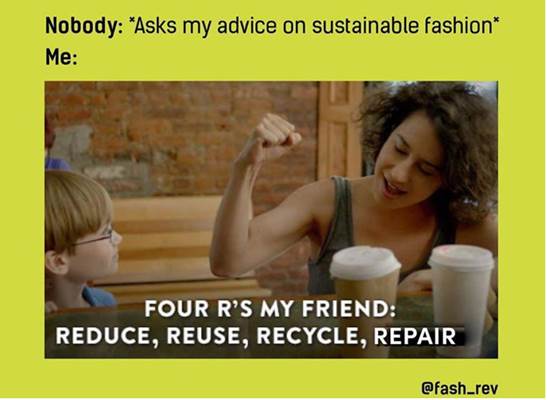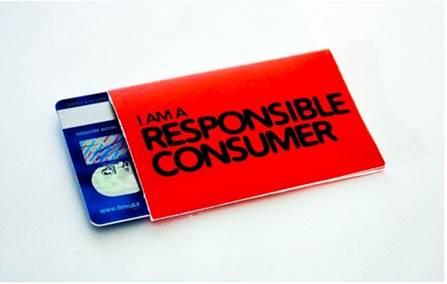To maintain a balance between nature and humanity, it is important we imbibe sustainability in our lives and look for ways to reduce the harmful impacts of consumerism.
Responsible consumerism simply means buying products that have little or no negative impact on the environment. This is important to bring a balance between what nature is giving us and what we are giving back.
Why is it important?
I’m sure that most of you can relate with me having a cupboard full of clothes left untouched and racks full of shoes hardly worn. We need to grow up and take responsibility for our stuff. It is important to understand the consequences of our everyday decisions and buying choices. It’s time to break up with shopping and become friends with the environment!
Here are 7 steps towards becoming a responsible consumer. This is a guideline that can be moulded into our everyday lives, small-small changes leading to a bigger goal:
1.Consume less:
The very first mantra should be to consume less. This may sound easy, but it really isn’t that easy. Especially for people who fall victims to sales, shopping sprees and retail therapy. The art that we need to perfect, is differentiating our needs and wants. Each time you stop by a store to buy something, you should ask yourself ”Do I really Need it?” You’ll get the answer. It’s okay to treat yourself to a little something every once in a while, but define what ‘once in a while’ means for you.
So, each time your heart is tricking you into buying a want of yours, think of using that money for something that you need instead.
Nowadays people know the price of everything, but the value of nothing
-Oscar Wilde
2.Avoid wasting resources:
Nothing in this world is free. If you’re not paying for it, someone somewhere surely is. Hidden costs are all around us, unexposed and unanswered.
India has been ranked at the 103rd position among 119 countries on the Global Hunger Index. According to the report, prepared by Welthungerhilfe and Concern Worldwide, India is among the 45 countries that have “serious levels of hunger”.
Simple things could be done every day to save resources and reduce their wastage. Don’t order too many things at a restaurant just because you fancied the items, but actually couldn't even finish them. Get leaking taps fixed and turn them off while brushing. Reuse water, for example re-use the wastewater from laundry for washing your car. Save electricity, turn off gadgets when they're not in use.
At the end of the day, you’re saving some of your money, and helping nature save a lot of its resources.
3.Buy less or no plastic
We have all heard about the damage plastic consumption is doing to our planet. In all honesty, plastic is one of the finest inventions; where can you find such a durable, waterproof, resilient material? The problem is--we humans exploited it way too far!
Single use plastic is the biggest epidemic of our times. Disposable plastic products like water bottles, straws, poly bags, packaging, etc should not be bought at all. Start small, carry your own reusable shopping bags, find package free stores to buy your supplies. Be conscious of ordering in food or your takeaways as that has a crazy amount of single use cutlery and packaging.

The disposal of plastic is a whole other issue all by itself. A paper by the World Economic Forum predicted that the amount of plastic in the ocean would actually be more than that of fish! Shocking, isn’t it? Unimaginable loads of plastic are sent to landfills. Toxic chemicals and compounds from these enter groundwater, which ultimately come back to us.
4.Follow the 4Rs: Reduce, reuse, recycle, repair
There’s a reason why the 3R strategy is so famous and has a separate fanbase on its own.
●Reduce: It asks to not be too hungry or greedy and identify the utmost things that we really need.
●Reuse: It is for giving a second life to things that are done with their initial purpose but still have so much more to give..
●Recycle: Be mindful and recycle things that have finished their life cycle.
●Repair: Be responsible for your items and fix them if and when needed.

5.Be conscious:
This is pretty easy and we do it unknowingly most of the times. Read labels present on the items you buy, have awareness about brands and stores, and read about what all you should be looking out for.
The global scenario right now is encouraging, as more and more people are turning conscious about themselves and the planet. There are a lot of online petitions and public polls going on, questioning corporate accountability. Go ahead and show your support. Every vote counts! You could come up with your own petitions and post them online or take it to social media.
Most importantly, be curious and ask questions. Your questions could range from the manufacturing conditions for products to its supply chain and marketing. For starters, pull out your favourites from your closet and ask #whomademyclothes?
6.Have high standards and integrity
Buy products supporting your values. Switch to sustainable brands that function on ethical practices. Support green fashion, DIY your beauty products and decor and be clear on your principles.
An upcoming trend is wearing pre-worn clothes and opting for second-hand clothing. In India especially, the tradition of passing on clothes has always been there. Why not try it out? Go to clothes swap events, thrift stores and what not - the list is endless!

7.Spread the word
Last but not the least, let the world know that you’re engaging in something good. Update it on social media and set an example for all your friends and family.
Now, it’s impossible to follow all of these steps right from the start. That’s okay, take it slow and build up step by step. Every time you buy something, know that you’re supporting the product, the brand and ultimately the industry. Vote ‘right’. You count, your choices count.

20240830145908.gif)








Comments